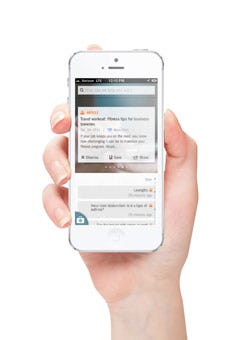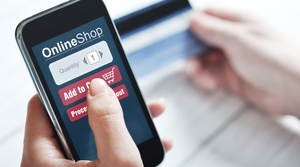One Man's Plan to Revolutionize Healthcare with a Mayo Clinic-Backed App
September 27, 2013
Geoffrey Clapp, co-founder of the mobile-health startup GetBetter, is developing a smartphone app, dubbed Better, that can help patients obtain preliminary diagnoses of health products, track medical records and locate physicians. Currently undergoing review by the Mayo Clinic, Better uses Mayo's database to help facilitate medical treatment. A patient with a stomach ache could check their symptoms on the app, and is given a list of top results. A nurse or doctor could then be contacted by merely clicking a button. In addition, the app can help patients track their medical records. While the app will give users the ability to track their health and store medical data for no cost, a monthly fee will be charged for on-demand access to health coaches and nurses.

At MedTechWorld's MEDevice San Diego conference this past week. Clapp discussed the many potential uses of the new integrated system and the limitations of current mobile health technologies. As of now, many health apps have been launched to limited success. According to data pulled from the Pew Internet & American Life Project, the number of people in the United States using technology to track fitness or health hasn't changed over the past three years.
On top of this, finding an effective business model for mobile health technologies has been a significant challenge. In 2008, Google launched Google Health, a web application designed to enable users to store health records in a centralized online database. However, Google Health was shuttered in 2012 after failing to attract a substantial market.
Better may do just that. While the company needs to refine legal details related to electronic patient records and various privacy laws, the app has a lot of potential and roughly 500 patients and clinicians have used it to track everything from pregnancy to diabetes.
With Better, patients will have easy access to health records. As more hospitals shift to electronic medical records (EMRs) from paper-based systems, the viability of smartphone-accessible health records increases. For patients, having on-demand access to EMRs could be valuable: For example, a patient enrolling a child in school could provide an administrator or nurse with a student's full vaccination record. For an emergency room visit, smartphone-accessible EMRs could help ensure that physicians have rapid access to a patient's health information.
On top of this, Better will provide basic medical information to patients, allowing them to decide when an illness calls for an immediate ER visit or a regular visit with a physician. This type of service has been implemented by many health insurance companies like Blue Cross Blue Shield: By calling a nurse hotline, people with insurance can talk to a nurse, helping them decide if an injury or illness is a true emergency.
According to Paul Limburg, a physician at the Mayo Clinic who is evaluating Better, the app can help address patient complaints that healthcare is hard to access and confusing.
As of now, Better is slated for release on the iPhone. The app will include an online symptom checker based on data from Mayo clinic. In addition, the app will include access to local healthy restaurants, local pollen counts and other health-related information. In addition, the app will allow patients of the Mayo Clinic to access to health records directly.
About the Author(s)
You May Also Like


